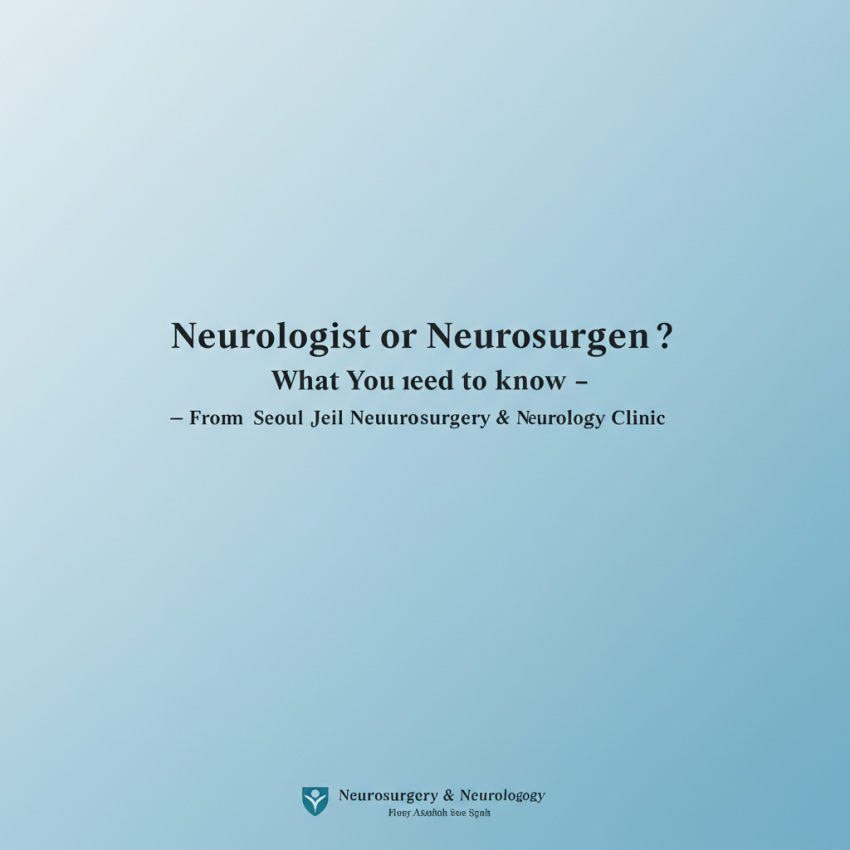Neurologist or Neurosurgeon? What You Need to Know
페이지 정보
작성자 서울제일 작성일 작성일25-09-17 16:59본문
Neurologist or Neurosurgeon? What You Need to Know – From Seoul Jeil Neurosurgery & Neurology Clinic
Have you ever asked yourself, “Should I see a neurologist or a neurosurgeon?” If you’ve experienced persistent headaches, numbness, arm or leg pain, or muscle weakness, it’s a very common question—especially among our patients near Hwagok Station and in Gangseo-gu.
At Seoul Jeil Neurosurgery & Neurology Clinic, many of our patients feel confused about which specialist to see first. Today, we’re here to clearly explain the difference between a neurologist and a neurosurgeon, when to see each, and how our clinic brings both specialties together to give you the best care possible.
What Does a Neurologist Do? Neurologists are medical doctors who specialize in the diagnosis and non-surgical treatment of nervous system disorders. They treat conditions involving the brain, spinal cord, nerves, and muscles. Common issues include migraines, dizziness, epilepsy, Parkinson’s disease, neuropathy, stroke, and multiple sclerosis.
Neurologists perform physical exams, order imaging tests like MRIs, conduct EEG or nerve conduction studies, and recommend medications, physical therapy, and other conservative treatments.
Source: American Academy of Neurology, Neurology Journal
What Does a Neurosurgeon Do? Neurosurgeons are doctors trained in performing surgery on the nervous system. They handle surgical procedures involving the brain, spine, and peripheral nerves. This includes brain tumor removal, spinal decompression, herniated discs, traumatic brain injuries, and more.
However, neurosurgeons don’t always rush to operate. They also evaluate non-surgical options and collaborate with neurologists to make the best treatment decision based on the patient’s condition.
Source: American Association of Neurological Surgeons, Journal of Neurosurgery
How Are They Trained Differently? Neurologists usually train in internal medicine first, then focus on nervous system disorders and medical management. Neurosurgeons go through rigorous surgical training and must develop expertise in anatomy, imaging interpretation, and operative technique.
In diagnosis, neurologists aim to localize the problem through clinical exams and tests. Neurosurgeons do the same but also assess whether surgery is appropriate, what type, and when.
Source: AO Spine Surgical Guidelines, European Journal of Neurology
Who Should You See First? Let’s Look at Some Cases
Gradual hand weakness, imbalance, and cervical spinal cord compression on MRI: Neurologist for initial workup, but surgery by a neurosurgeon may be necessary.
Chronic migraines with no findings on imaging: Neurologist manages with medication, lifestyle, and possibly nerve block.
Traumatic spinal cord injury after a fall: Emergency neurosurgical care is essential.
Carpal tunnel symptoms: Neurologist can confirm with nerve conduction studies. If symptoms don’t improve, surgery by a neurosurgeon may be needed.
Source: Journal of Neurology, Journal of Spine Surgery
Common Misconceptions Here are a few misunderstandings we often hear:
“If my MRI shows a problem, I must have surgery.” → Not true. Many conditions can be managed conservatively.
“Neurologists just diagnose—they don’t treat.” → False. They offer medical, rehabilitative, and interventional therapies.
“Neurosurgeons only do surgery.” → Not necessarily. They often try conservative treatment first and choose surgery only when truly needed.
Source: AO Spine Practice Guidelines 2025, Spine Journal 2025
What Do Recent Studies Say?
Patients with chronic low back pain due to identifiable structural issues benefit from surgery in selected cases.
Early decompression in moderate to severe cervical myelopathy leads to better outcomes.
Nutritional optimization and managing comorbidities lower surgical risks.
Acute spinal cord injuries treated within 24 hours surgically have improved long-term function.
Source: Journal of Neurosurgery, Lippincott, AO Spine 2025 Guidelines
What We Offer at Seoul Jeil Neurosurgery & Neurology Clinic At our Gangseo-gu location, near Hwagok Station Exit 1, we offer integrated care with both neurologists and neurosurgeons under one roof. Here’s what we provide:
In-house MRI, CT, EMG, EEG, and nerve studies
Non-surgical treatment: medication, physical therapy, injections, lifestyle and nutrition counseling
Surgery for conditions like spinal stenosis, disc herniation, spinal cord tumors, or trauma
Team-based care where neurologists and neurosurgeons collaborate closely
Source: Seoul Jeil Clinical Guidelines
When Is Surgery Necessary? Surgery may be considered when:
There is progressive neurological deficit (weakness, gait issues, bladder problems)
Imaging shows spinal cord or nerve root compression
Conservative treatment has failed
Trauma requires urgent decompression
Patient’s overall health and goals align with surgical benefit
Our clinic always practices shared decision-making—discussing risks, outcomes, and expectations thoroughly.
Source: American Academy of Orthopaedic Surgeons Guidelines
A Real Case from Our Clinic A 62-year-old man came in with hand numbness and balance issues. MRI showed moderate spinal cord compression. Our neurologist conducted tests and ruled out other causes. After 2 months of non-surgical care with no improvement, our neurosurgeon performed decompression. Six months later, his walking and hand function improved significantly.
Source: Seoul Jeil Clinical Case Record
Quick Guide: Who Should You See?
Sudden trauma, paralysis, or loss of bowel/bladder function → Neurosurgeon
Slowly progressing weakness or numbness → Start with a Neurologist
Chronic pain, migraines, movement disorders → Neurologist
At Seoul Jeil, we’ll direct you to the right expert based on your symptoms.
Final Thoughts Neurology and neurosurgery work hand in hand. Neurologists handle diagnosis and medical treatment; neurosurgeons step in when surgery becomes necessary. Together, they provide complete care.
At Seoul Jeil Neurosurgery & Neurology Clinic, we are proud to offer both specialties in one place. Whether you need a careful evaluation or surgical expertise, we’ll guide you step by step.
If you live near Hwagok Station in Gangseo-gu and are unsure where to start, reach out to us. Early evaluation can make all the difference in recovery.


 TOP
TOP


